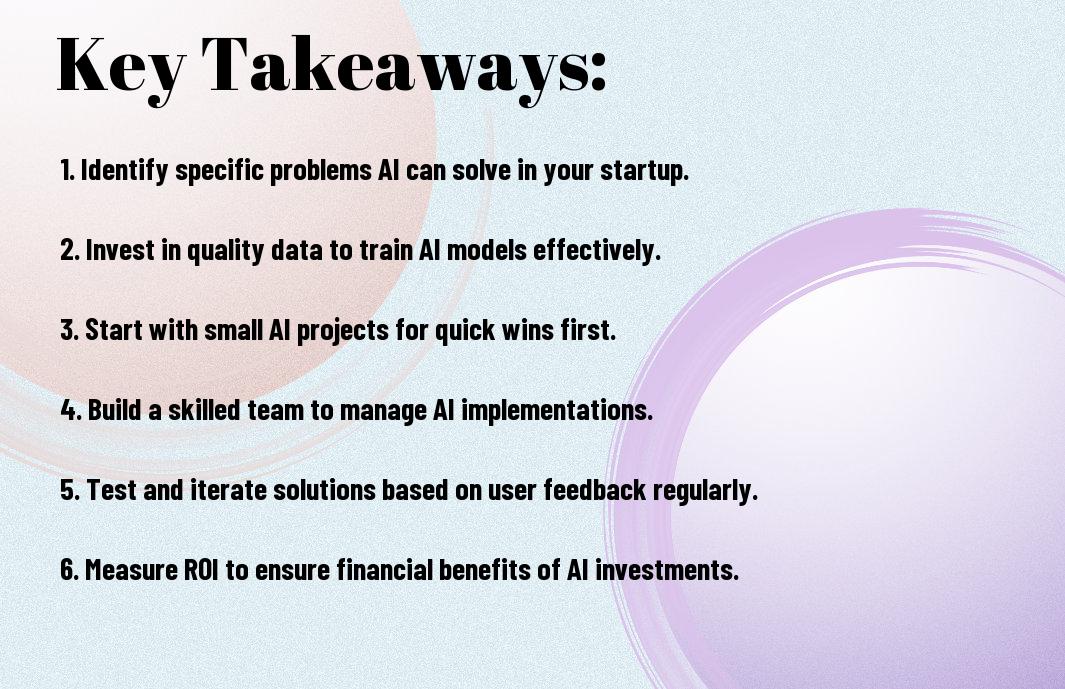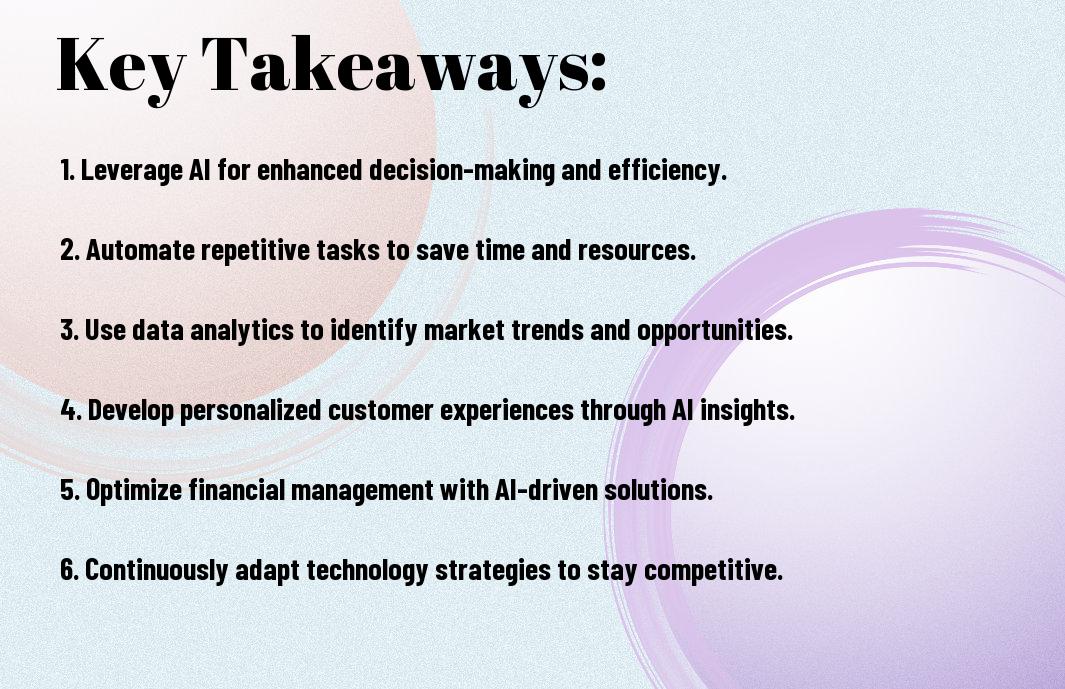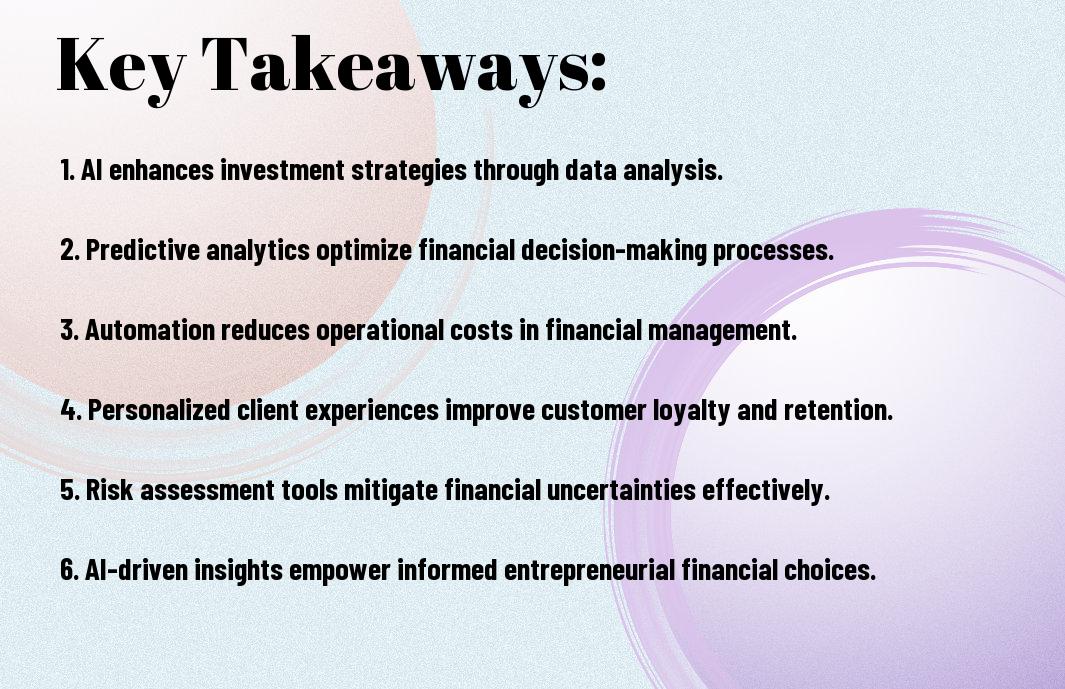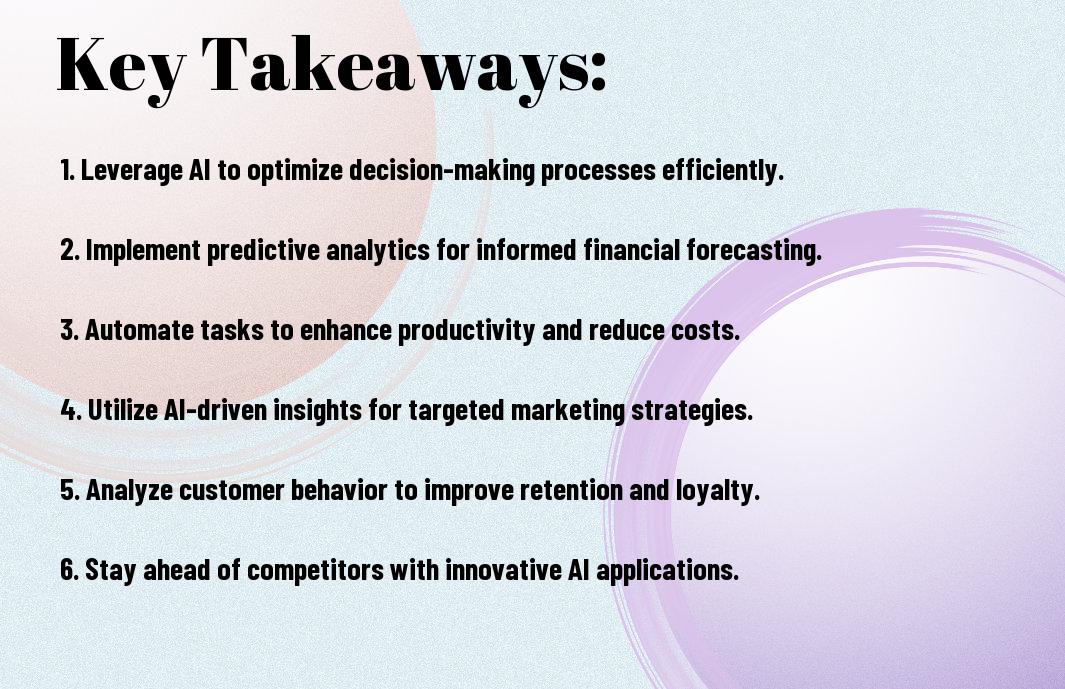As you navigate the competitive startup landscape, you’re likely exploring ways to boost efficiency and drive growth. You can leverage artificial intelligence (AI) to optimize operations, enhance customer experiences, and increase revenue. By integrating AI into your startup, you can automate tasks, gain valuable insights, and make data-driven decisions that propel your business forward. You will learn how to harness the power of AI to maximize your financial impact and stay ahead of the curve.
Key Takeaways:
- Identify High-Impact Areas: To maximize financial impact, startups should focus on integrating AI into areas that have the potential to drive significant revenue growth or cost savings, such as customer service, marketing, or operations.
- Develop a Strategic AI Roadmap: Startups should develop a clear AI strategy that aligns with their business goals and objectives, and prioritizes the development of AI-powered solutions that can drive tangible financial benefits.
- Monitor and Measure AI Performance: To ensure maximum financial impact, startups should establish key performance indicators (KPIs) to measure the effectiveness of their AI-powered solutions, and continuously monitor and refine their AI strategies to optimize financial returns.
Assessing Your Startup’s AI Readiness
Before integrating AI into your startup, you need to assess your readiness for this technology. This involves evaluating your current infrastructure, identifying areas that can benefit from AI, and determining the resources you need to implement AI solutions effectively.
Identifying Pain Points and Opportunities
Around this time, you should look for areas where AI can help solve problems or improve processes in your startup. You will need to identify specific pain points and opportunities where AI can add value, such as automating tasks or enhancing customer experiences.
Evaluating Technical Capabilities and Resources
Startups like yours often have limited resources, so you need to evaluate your technical capabilities and resources carefully. You should assess your data quality, infrastructure, and talent to determine if you have what it takes to support AI adoption.
Resources such as data scientists, engineers, and IT infrastructure are important for successful AI integration. You will need to consider whether you have the necessary skills and expertise in-house or if you need to outsource some of these functions to external partners or vendors, and ensure that your budget can accommodate the costs associated with AI adoption.

Strategic AI Implementation Models
There’s no one-size-fits-all approach to integrating AI into your startup, but you can learn more about How to Implement AI in Your Business for Maximum Impact to inform your strategy.
Build vs. Buy vs. Partner Decisions
AFTER you’ve defined your AI goals, you’ll need to decide whether to build, buy, or partner to achieve them, considering factors like cost, expertise, and scalability to make the best choice for your startup.
Cost-Benefit Analysis Framework
BEFORE making any decisions, you’ll want to establish a cost-benefit analysis framework to evaluate the potential return on investment for your AI initiatives, ensuring that you’re allocating resources effectively.
Understanding the cost-benefit analysis framework is key to maximizing your AI investment, as it allows you to weigh the potential benefits of AI adoption against the costs, and make informed decisions about where to allocate your resources for the greatest impact on your startup’s bottom line. You’ll be able to identify areas where AI can drive the most value, and prioritize your initiatives accordingly.
Revenue-Generating AI Applications
Unlike traditional methods, AI-driven approaches can significantly boost your startup’s financial performance by identifying new revenue streams and optimizing existing ones, allowing you to make data-driven decisions to drive growth.
Customer Acquisition and Retention Tools
Customers are the lifeblood of your business, and AI-powered tools can help you acquire and retain them by personalizing their experience, predicting their behavior, and improving your marketing efforts to target the right audience.
Product Enhancement Through AI
With AI integration, you can enhance your products and services, making them more competitive and attractive to your target market, which can lead to increased customer satisfaction and loyalty, ultimately driving revenue growth.
Hence, as you probe into product enhancement through AI, you will discover that it enables you to analyze customer feedback, identify areas for improvement, and develop innovative solutions that meet their evolving needs, allowing you to stay ahead of the competition and maximize your financial impact.

Operational Efficiency Through AI
For startups, operational efficiency is key to maximizing financial impact, and AI can help you achieve this by streamlining processes and reducing costs.
Automating Routine Business Processes
Along with the implementation of AI, you can automate routine tasks, freeing up your team to focus on high-value activities that drive growth and innovation.
Predictive Analytics for Resource Allocation
For optimal resource allocation, you can leverage AI-powered predictive analytics to forecast demand, identify trends, and make data-driven decisions that optimize your operations.
Understanding how to apply predictive analytics to your resource allocation can have a significant impact on your startup’s financial performance, as you will be able to allocate resources more effectively, reduce waste, and capitalize on new opportunities, allowing you to stay ahead of the competition and drive long-term success.
Funding and Investment Considerations
Not all startups have the luxury of unlimited funding, so you need to be strategic about how you allocate your resources when integrating AI into your business.
Attracting Investors with AI Strategy
Around the time you’re developing your AI strategy, you should be thinking about how it will impact your ability to attract investors, as a well-planned AI integration can be a major selling point for your startup.
Budgeting for AI Development
Considering the costs associated with AI development, you should prioritize your spending and focus on the areas that will have the greatest impact on your business, such as data collection and talent acquisition.
Strategy is key when it comes to budgeting for AI development, as you will need to balance the costs of development with the potential benefits, and you should be prepared to make adjustments as your project evolves, ensuring that your spending aligns with your overall business goals and that you are getting the maximum return on your investment.
Measuring AI ROI
Once again, you’ll need to assess the financial impact of AI on your startup, and measuring ROI is imperative to understanding its effectiveness. You’ll want to track key metrics to determine whether your AI investments are generating returns.
Key Performance Indicators
Among the various metrics, you should focus on those that directly impact your bottom line, such as revenue growth, cost savings, and customer acquisition costs. You can use these indicators to evaluate the success of your AI initiatives.
Iterative Improvement Methodology
To continually improve your AI investments, you should adopt an iterative approach, refining your strategies based on data-driven insights. You can use this methodology to optimize your AI systems and maximize returns.
This iterative improvement methodology involves continuously monitoring your AI systems’ performance, identifying areas for improvement, and implementing changes to optimize results. You can use techniques like A/B testing and machine learning model refinement to fine-tune your AI investments, ensuring that you’re getting the most out of your technology and driving maximum financial impact for your startup.
Final Words
So, as you initiate on integrating AI into your startup, you’ll be able to maximize your financial impact by leveraging its potential. You can learn more about the advantages of AI adoption by visiting 5 Key Benefits of Integrating AI into Your Business – HBS Online to discover how you can drive growth and innovation in your business, and make informed decisions to boost your bottom line.
FAQ
Q: What are the initial steps to integrate AI into my startup for maximum financial impact?
A: To integrate AI into your startup, start by identifying areas where AI can bring the most value, such as automating repetitive tasks, enhancing customer service, or improving data analysis. Next, assess your current infrastructure and talent pool to determine what AI solutions can be easily implemented. It’s also imperative to set clear goals and metrics to measure the success of AI integration. Consider consulting with AI experts or conducting thorough market research to find the best AI solutions for your specific needs.
Q: How can I ensure that my startup’s data is prepared for AI integration?
A: Preparing your data for AI integration involves several steps. First, collect and centralize your data from various sources into a single, accessible platform. Then, clean and preprocess the data by handling missing values, removing duplicates, and normalizing the format. It’s also vital to ensure data quality and integrity by implementing data validation and verification processes. Furthermore, consider data anonymization and encryption to maintain privacy and security. Lastly, organize your data in a structured and labeled format that AI algorithms can easily process and learn from.
Q: What are the most effective AI technologies for startups to adopt for financial impact?
A: The most effective AI technologies for startups vary depending on the industry and specific needs. However, some of the most impactful AI technologies include Machine Learning (ML) for predictive analytics and automation, Natural Language Processing (NLP) for customer service and text analysis, and Computer Vision for image and video analysis. Additionally, consider adopting Robotic Process Automation (RPA) for automating repetitive tasks and workflows. It’s also worth exploring the potential of Deep Learning and neural networks for complex data analysis and pattern recognition.
Q: How can I measure the financial impact of AI integration in my startup?
A: Measuring the financial impact of AI integration involves tracking key performance indicators (KPIs) such as revenue growth, cost savings, and return on investment (ROI). Monitor how AI-powered solutions affect customer acquisition and retention, sales, and operational efficiency. Use data analytics tools to compare pre-AI and post-AI implementation metrics, and adjust your strategies accordingly. It’s also imperative to conduct regular audits and assessments to ensure that AI solutions are aligned with your startup’s overall financial goals and objectives.
Q: What are the potential risks and challenges associated with integrating AI into my startup, and how can I mitigate them?
A: Integrating AI into your startup comes with potential risks and challenges, including data privacy and security concerns, job displacement, and the need for significant upfront investment. To mitigate these risks, ensure that you implement robust data protection measures, such as encryption and access controls. Provide training and upskilling programs for employees to work effectively with AI systems. Additionally, develop a phased implementation plan to manage costs and minimize disruption to your operations. It’s also vital to establish clear AI governance and ethics guidelines to ensure that AI solutions align with your startup’s values and principles.









